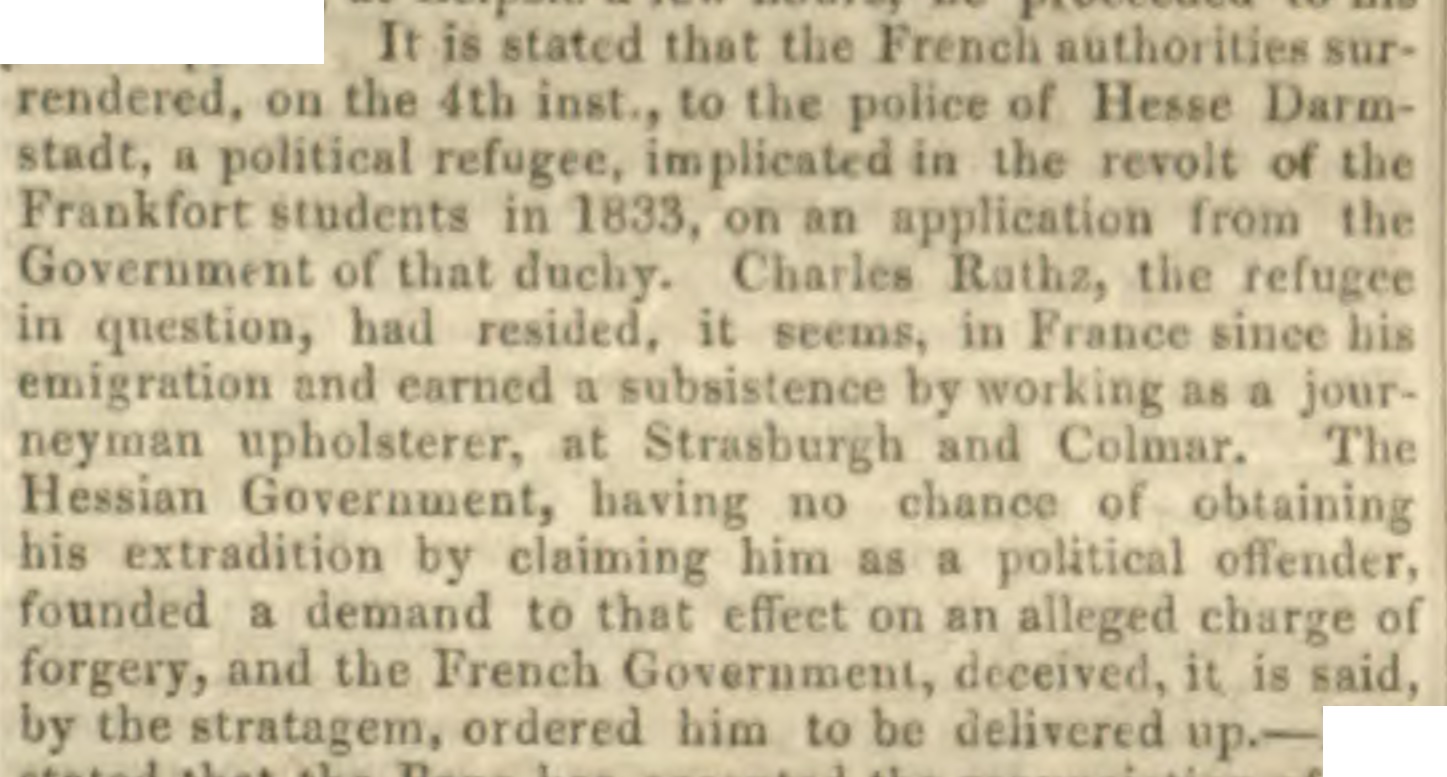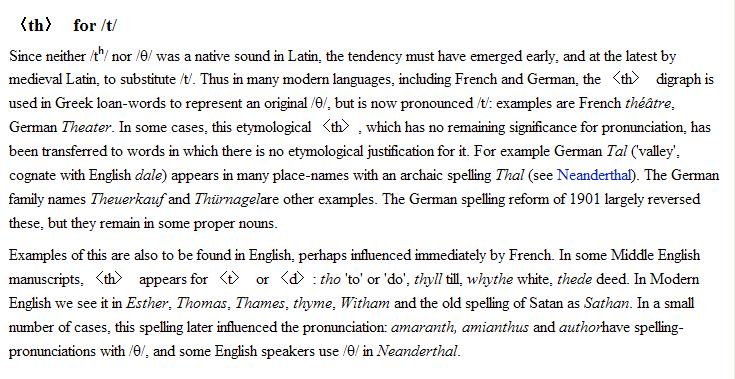Analysis of the Charles Franklin Rutz and Carl Ruthz names
Hrōþ
Ruthz
German and Swiss German: From a short form of any of the various personal names beginning with the Old High German element Hrōþ meaning ‘renown’
Hrōþ (Hroth): a Proto-Germanic term for fame, glory, appearing in various personal names
Thorn (letter)

Thorn or þorn (Þ, þ), is a letter in the Old Norse as well as some dialects of Middle English. The letter originated from the rune ? in the Elder Fuþark, called thorn in the Anglo-Saxon and thorn or thurs ("giant") in the Scandinavian rune poems, its reconstructed Proto-Germanic name being Thurisaz.
It has the sound of either a voiceless dental fricative [?], like th as in the English word thick, or a voiced dental fricative [ð], like th as in the English word the. Modern Icelandic usage excludes the latter, which is instead represented with the letter eth (Ð, ð), though it has a voiceless allophone [?], which occurs in certain positions within a phrase.
updates:
October 10, 2017 - 1842 example of Ruthz spelling used in a newspaper
April 21, 2012 - It is generally accepted that Rutz was derived from Ruthz which was derived from Hrōþ
July 11, 2009 - web page created
|
An 1842 example of "Ruthz" used in a newspaper:
Mention of Charles RUTHZ in 1842, Vol. 2, p. 259 of The Gardeners' Chronicle
(provided by Janet Robson of Austrailia)
The original PDF of the document is archived and available at:
https://archive.org/search.php?query=The%20Gardeners%27%20Chronicle
https://archive.org/details/mobot31753002317888
https://ia800503.us.archive.org/22/items/mobot31753002317888/mobot31753002317888.pdf

Note that European "last names" or "surnames" are recent inventions that started around 1000 AD.
The Catholic Church wanted to keep better birth and mariage records and required individuals to create last-names
European last-names were invented with little to no thought in order to meet the requirements of the Catholic Church.
So, we might imagine around 1000 AD a Carl from Charborow going to the local church to register and suggesting to the
authority that he was Carl that was well known to the local villagers.
The name Ruthz was a spinoff from Hroþ (meaning famous or well known).
Here are some thoughts on the "Ruthz" name:
The "Ruthz" spelling on the 1854 New Orleans immigrant list is more logical (historically) than the more common "Rutz" spelling.
þ is from various ancient European alphabets and has a "th" sound".
Many German names use Hroþ as the prefix.
The "h" in Hroþ is mostly silent.
The "r" in Hroþ is a guteral German "r" sound.
The "o" in Hroþ and the "u" in Rutz have similiar pronunciations.
The "þ" in Hroþ is pronounced similiar to the "th" in Ruthz.
The "z" in Ruthz has a "ts" sound in German and is probably a modifier to Hroþ (e.g. Hroþz would be a Gothic cognate meaning famous (from Hroþ meaning fame) and probably means an ancestor of (son-of) Hroþ).
"þ" started being replace by "th" around the 14th century shortly before written names became common.
An email from John Hoffmann to his Uncle Owen Rutz discussing the "h" in Ruthz
John lived for several years in Germany during his "college years".
He has studied and is fluent in the German language.
----- Message ----
From: John Hoffmann
To: Owen Rutz
Sent: Friday, July 10, 2009 7:06:59 PM
Subject: The "h" in "Ruthz": Upon further examination...
Uncle Owen,
I was just looking at the Aeolus passenger list.
First, it appears that the same hand wrote all of the names.
Second, according to the passenger list, I would discount the ü umlaut theory.
There are other examples of ü (see #137).
The writer liked to put a flourish on the end of his "R"s and distinctly marks the two dots of the Umlaut.
Also, Germans notice the difference between "u" and "ü" in a way that I cannot.
If the writer were German, as I assume he was, being in Bremen, he would have given the name umlauts as he did the other names.
Furthermore, that really does look like an "h".
While there is no "th" sound in German, read the following wonderful Wikipedia entry about how the letter combination "th" is pronounced as a "t".
At the bottom all the mysteries are revealed.
It probably was spelled "Ruthz" but was then changed when they came to America to reflect the original German pronunciation.
Furthermore, the "th" combination does not remain in German (except the loan-words mentioned below) because of the spelling reform of 1901, hence my confusion.
Therefore, I think you can confidently search for "Ruthz" which is pronounced just as you pronounce your name currently.
John
From Wikipedia: "th" for "t"

An email from John Hoffmann to his Uncle Owen discussing how to pronounce Rutz:
From: John Hoffmann
To: Owen Rutz
Sent: Saturday, July 11, 2009 11:13:52 PM
Subject: Re: How to Pronounce Rutz
Uncle Owen,
The name "Rutz" has two of the three most difficult sounds for a native English speaker to pronounce. The "R" and the "U", particularly the difference between "ü" and "u", is why Americans have an american accent when speaking German. There is no real equivalent to the German "R" and the the German "ü" (note the umlaut). The "R" is indeed more guttural and rolled which makes it very difficult to pronounce. But you are correct that it is in the same neighborhood as the English "R".
Here is a website with pronunciation of the various letters. http://userweb.port.ac.uk/~joyce1/abinitio/pronounce/
"Rutz" would have been pronounced with a "consonantal r" (see the section on German Consonants on the above page). The "u" would probably have been short (see the section on German Vowels, long and short "u"). The "tz" is actually interesting because the German "z" is pronounced "ts" (e.g. bits, hits, pats). So in German, "Ruz" would be pronounced the same as "Rutz" and also, as we discovered, "Ruthz". The combination "tz" does in fact occur in German (see the link at the same site about the consonant "z" for some examples of other "tz" combinations).
The crux of your question, though, is whether the name is pronounced like "ruts" or "roots". First a disclaimer: vowels are extremely vulnerable to shifts in dialect. Think of how someone from Boston pronounces their short "o" compared to someone from Chicago, Alabama, or Texas whereas everyone pronounces their "p" and "q" the same. So, our ancestors may have pronounced the vowels in their name very differently than we now would pronounce it.
I know that's a long disclaimer, but I think I can conjecture an answer. Generally, the "ü" (umlaut) has a more distinctive "ee" character to it. That is to say, more like "roots" instead of "ruts". Since the ship's manifest clearly does not have an umlaut over the "u", I believe the correct pronunciation, all dialect issue aside, would be closer to "ruts". Listen especially to the recording of the short "u" and make special note of the word "Butter" (a cognate with the English word). It is a short "u" followed by a "t", just like in the name "Rutz". That is probably the closest you are going to get to hearing how the "u" in "Rutz" would be pronounced.
The analogy that your friend gave of "foot" for the short german "u" is probably as close to an equivalent as you're going to get. It's not quite perfect, though.
When you listen to the recording, though, you will probably agree that the short "u" does not sound much like "ruts" or "roots". But since there is not an umlaut over the "u", it would not be a very aggressive "oo" sound. I think you need a third alternative: not "ruts," nor "roots" but "foots" with an "r" instead of an "f".
It's difficult to write about word sounds. Sorry that I can't be more lucid. Hopefully the recordings will give you a better idea.
Ok, I'm reading more about how the "th" "t" and "d" sounds evolved in German. There was something called the "High German Consonant Shift" which occurred in the mid to late first millennium (http://en.wikipedia.org/wiki/High_German_consonant_shift). Chomp on that article until your jaw hurts. This stuff is pretty damn complicated, and I am in uncharted territory. I will look more into how those consonants sounds are pronounced, but I think in 1854 that "d" was probably pronounced just like a "d" now, "t" was pronounced just as a "t" is currently pronounced, and "th" was pronounced as a "t" as my first e-mail indicated, but it retains the antiquated (pre- High German consonant shift) spelling "th" that was changed with the spelling reform of 1901.
Keep in mind 1854 is not that long ago, so the consonants were probably pronounced the same way as they are today.
I'm very tired and I've been reading Joyce's Ulysses all day. My brain is a bit scrambled so I'm not sure if any of this makes sense. Please ask any follow up questions and I will try to clarify. I am enjoying the philological detective mission.
John
Rambling thoughts from Owen on the Charles Rutz name:
I've been reading about German names. I haven't found anything specifically about the name "Rutz".
Carl Ruthz is the name that was written on the passenger list of the Aeolus in 1854.
After he immigrated to the United States, he used the name Charles Franklin Rutz.
The "h" in Ruthz is rare.
But, Ruthz spelling with the h does exist in a few rare cases.
Charles and Franklin were not names used in Germany in 1820.
Carl and Freidrich were very commonly used.
Perhaps Charles Franklin Rutz was Carl Freidrich Ruthz in Germany.
It was common for Germans to Americanize their names when they emigrated to the United States.
It seems reasonable that Rutz may have commonly been converted to Roots.
Perhaps Charles Rutz thought about changing his name to Charles Roots - it was spelled that way in the 1860 1nd 1870 US Census.
But, apparently he decided to go by Rutz in 1880 until he died in 1912.
Here is some additional information about the names:
Carl:
From the Germanic word "churl" meaning man (before 500 AD) and then later "free man" and then "free peasant".
It is the original German spelling preceding the variant Karl which became popular in the 1800's.
The perennial popularity of this name in the German-speaking world was reinforced by the fact that it was an aristocratic and royal name from an early date, being borne, for example, by no less than seven Austrian emperors. Its status as an imperial name is reflected in the fact that the Polish, Czech, and Hungarian vocabulary words for “emperor” are derived from the personal name: król, král, and király respectively.
Feminine forms: German, Scandinavian: Karla, Carla
Charles:
The French derived the name Charles from Germanic word for "free man", and popularized the name in Europe. It later became popular in England.
The name originally owed its popularity in Europe to the Frankish leader Charlemagne (742–814), who in 800 established himself as Holy Roman Emperor.
His name (Latin Carolus Magnus) means “Charles the Great”.
Rutz:
It is generally accepted that Lutz is a nickname (short form or pet name) for Ludwig.
Perhaps Rutz is a nickname for Rudolf (derived from Old Germanic Hrodwulf, meaning "famous wolf.")
Before about 1,000 AD, surnames were not needed or used. There wern't enough people around to really require them.
If you had several Carl's in your village, you might refer to Carl the farmer, Carl from the valley or Carl son of Hermann.
Rutze and ruce mean cobbler from Middle Low German, but I think Rutz was already a name before that was a word. I don't think Rutz is a "occupation name".
Supposedly, there is a Rutz location in Switzerland. But, I haven't found it on a map. I don't think Rutz is a "location name".
I'm not sure what to make of the Ruthz spelling of Rutz. I suppose it could have been a typo. The "t" was crossed slopily on the passenger list. Perhaps he tried to disguise his name because he was running from the Prussian army. Obviously I'm just guessing. The Ruthz spelling is very rare - but, it does exist. If I can find some German documentation on him, it would settle that issue.
The occupation and childrens names and ages are definately correct information on the Aeolus passenger list. His age is probably also correct. He was very consistant about his birth date. His wife's name was probably Caroline - just as it says on the passenger list. If they were indeed from Charbrow, Pomerania - it might be easy to find some babtismal records for Augusta or something. So far, I'm not finding much on the German Bohemia front. Checkoslovakia is even more off the internet than Poland.
The oldest Rutz in the RootsWeb WorldConnect database is Philips Rutz, 1530-1592, Asbach, Germany. Asbach is also in southwest Germany, about 240 km north of Sudwestpfalz.
The first European surnames seem to have arisen in northern Italy around 1000 A.D., gradually spreading northward into the Germanic lands and the rest of Europe. By 1500 the use of family names such as Schmidt (smith), Petersen (son of Peter), and Bäcker (baker) was common in the German-speaking regions and all across Europe.
The Council of Trent (1563) — decreed that all Catholic parishes had to keep full records of baptisms. The Protestants soon joined in this practice, furthering the use of family names throughout Europe.
This is why we can trace "Rutz" back to the mid-1500s.
Based on what I know so far, I would guess that Rutz was a spinoff from Hrod (meaning famous or well known).
Many German names use Hrod as the prefix.
The "h" in Hrod is mostly silent. The "o" in Hrod and the "u" in Rutz are similiar. The "d" in Hrod is pronounced similiar to the "t" in Rutz.
Hrólfr Kraki, Hroðulf, Rolfo, Roluo, Rolf Krage (early 6th century) was a legendary Danish king who appears both in Anglo-Saxon and in Scandinavian tradition. His name would in his own language (Proto-Norse) have been *Hroþiwulfaz[2] (famous wolf).
Middle names started being used when Catholics started giving their sons the same first name as his father's father in the 1700's. The middle name was used to help eliminate confusion between grandfather and grandson.
http://en.wiktionary.org/wiki/Appendix:Proto-Germanic/hr%C5%8D%C3%BEiz